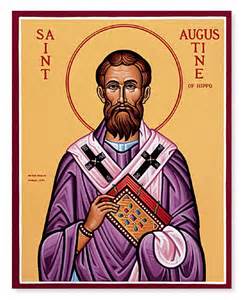
What did you learn about Augustine’s conversion?
Augustine played a huge role in the advancement of Christianity and was commonly referred to as the “Architect of the Middle Ages.” As Everett Ferguson points out, “Augustine has continued to be a major influence in theology for both Catholics [in their view of sacraments] and Protestants [in their views regarding grace and salvation.]”
Due to his extensive writings and the biography written by his disciple Possidius, we know more about Augustine’s life and the development of his understanding and teaching of scripture than any other person in the ancient world. Upon examination of all the resources available pertaining to Augustine’s life and conversion, the overwhelming requirement to overcome one’s need for significance and appetites of the flesh are the resounding themes. It was true for Augustine and it remains true today. God is continually trying to speak to everyone and while Augustine’s conversion experience seems miraculous, it is no more of a miracle than simply obeying God’s command to read His Word and then by our actions, if we truly love Him, we will obey what it commands. In Augustine’s City of God, he portrays there being two cities: one just and one wicked and as Fergusson illustrates, “Through their love, human beings adhere to either the one or the other: to God or to self… [Ultimately,] God’s judgment consists in giving people what they love most, [everlasting] life with Him or [eternal] separation for Him.”
In Augustine’s conversion, he came to understand the mercy and grace of God. As a result, he wanted his life to be a living sacrifice that was pleasing to the Lord. He allowed God to transform his life through the renewing of his mind, which came from a deeper understanding of God’s word. Augustine recognized the work of the Holy Spirit and allowed the Spirit to work not only in him, but also through him. He recognized the errors of his ways and then sought to help people avoid making the same mistakes while also helping those currently struggling with the same issues. He took on the humility of Christ in his walk and continually rejoiced in the salvation of his soul and in the God he served. His method of showing teachers must continually be learning and that mentors must always be disciples is the model the church should still strive for because as Christians, we must always be learning and growing in our faith.
Who witnessed to him?
Augustine was born in Tagaste, North Africa to a Christian mother, now named Saint Monica. His father, Patricius was a pagan, but would convert to Christianity and be baptized before his death. While his parents were split on religious views, they both wanted their son to receive the best education and as a result, he would become one of the most renowned professors of rhetoric due to his gifting in communication. Despite this gift, he was unsatisfied by his current teaching in Africa and would ultimately become engrossed by the radical dualistic teaching of Manichaeism because it presented itself as the Christianity for intellectuals. Over time, Augustine began to have doubts and when Faustus was unable to answer his questions, Augustine turned his attention to magic and astrology. Soon after this, Augustine and his mother moved to Rome where his skepticism led him to Neoplatonism where he learned from Plotinus that all beings are good and that there are spiritual realities.
In 384, Augustine became the professor of rhetoric in Milan and during his time there, he went to hear a famous public speaker named bishop Ambrose. It was under Ambrose that Augustine first heard a much more intellectually respectable interpretation of the Bible. Shortly after this, the presbyter Simplicianus would take on Augustine as a personal project and during this time Augustine began to wrestle more with action versus belief. While it was apparent Augustine had undergone an intellectual conversion, his spiritual and moral conversion were not yet complete.
What other factors led to his coming to faith in Christ?
Above all else, it was Augustine’s understanding of philosophy that would lead him not only to faith, but would also make his contributions to academia and literature timeless. His official conversion experience took place in 386 after he heard a little girl singing, “Pick up and read.” When he walked over to where the voice was coming from, he found a book on the letters of Paul, which read, “Let us behave decently, as in the daytime, not in carousing and drunkenness, not in sexual immorality and debauchery, not in dissension and jealousy. Rather, clothe yourselves with the Lord Jesus Christ, and do not think about how to gratify the desires of the flesh.” Augustine believed this encounter to be divine and that the Lord was speaking directly to him because of his own personal struggle with sexual self-control. After contemplating this encounter with God and its significance in his life, he enrolled for baptism, which he received from Ambrose on Easter Sunday the following year. Fergusson illustrates how, “He had found his way back to the faith of his childhood and turned his back on his oratorical career.”
Augustine also recognized the burdens and baggage of this world were weighing him down; on his own, he was powerless to do anything, but when he surrendered them to Christ, he was set free. His conviction to the truth of God was the lamp unto his path and the redemptive work God did in his life led him in his service to the church. His devotion and dedication to God is much Paul’s model, as he encouraged believers to follow him as he followed Christ.
Bibliography
Ferguson, Everett. Church History: Volume One From Christ to the Pre-Reformation 2nd Edition. Grand Rapids, MI: Zondervan, 2013.
